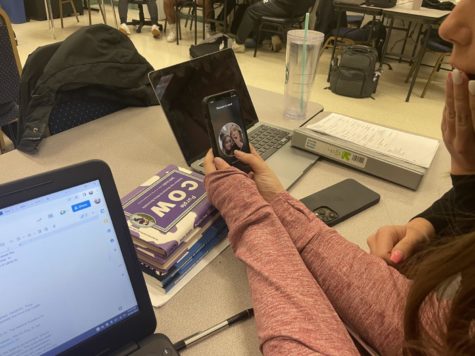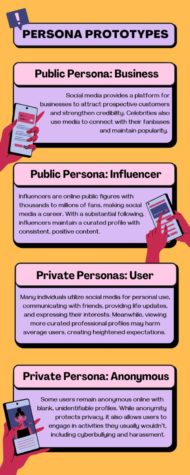Your donation will support the student journalists of Chantilly High School. Your contribution will allow us to cover our printing and annual website hosting costs.
The fake reality
December 8, 2022
Social media platforms today actively promote authenticity to users to counter the loss of originality, even at the expense of their privacy. One platform in particular continues to gain popularity among Generation Z, BeReal.
Initially released in 2020, BeReal did not take off until early 2022, and now has a 315% growth rate of monthly active users, per Apptopia. BeReal’s initiative is to dispel the notion that social media can be time-consuming and pressure-inducing and create a new way to discover friends in their daily lives, according to NPR. With the slogan “Your Friends for Real,” the app is intended to serve as a platform where users are encouraged to be candid and share the most authentic versions of themselves.

But by nature of social media, its mission is not always executed. As creators curate content towards audience’s expectations, staging and editing photos, they ultimately sacrifice the reality element.
“I would have to make a mundane task seem interesting or funny,” junior Josh Jocuns said, reflecting on his BeReal experience. “It was not real because if it was, it would just be me at my desk with a piece of paper in front of my laptop, which I find really boring.”
Other media platforms, including Snapchat and Instagram, cite a similar trend among their users: inauthentic authenticity. Like BeReal, private stories on Snapchat offer a glimpse behind-the-scenes with more unfiltered content, for a group of the users’ choice. Feelings of obligation can motivate people to add people to their private stories to showcase a fake facade of friendship.
“I used to have this horrible thing where I had 10 different private stories with sets of people sometimes overlapping,” Jocuns, who deleted Snapchat and Instagram, said. “Moving away from Snapchat and Instagram gives me a better way of solidifying who I am.”
Online use frequently results in personas, where people create different versions of themselves to display on the internet. Personas are most commonly associated with business accounts, where creators are subject to rules on how they should portray themselves on social media.
“With pageantry, we are held to a certain standard where there’s only certain things that we are allowed to post,” pageant queen and senior Tori Felder said. “We’re not allowed to post anything that’s negative, which is why I always post bright stuff on my social media.”
Personas, for many, is a branding tool, representing a company or attracting customers and viewers. In these situations, the internet allows businesses to connect with customers and strengthen their credibility, according to Forbes. In addition, celebrities need to be able to effectively market themselves on the internet, whether it’s by themselves or by a social media manager, in order to continue being relevant and promote their brand, per Brain Candy.
“Unlike most people, celebrities live off of making money by their fans,” TikTok influencer and senior Cole Hansen said. “They would need to create stable relationships no matter how fake it is. It’s just how their job is. It makes sense for them to have a persona.”

Hansen has amassed more than 283.9K followers and 8.5 million likes on TikTok for a variety of content, including beauty and lifestyle.
Oftentimes, audiences develop their own perceptions of content creators based on a limited online image, which can yield disappointment when reality is revealed. Failure to live up to a perceived persona can be anybody’s downfall: cancel culture has ended careers.
“Cancel culture sets a bad precedent that if something’s wrong, they can’t be redeemed in any way,” senior Micaela O’Rourke said. “However, I do think that there are some things that are unforgivable. So in some way it’s good about setting the precedent of things like sexual assault not being okay.”
In the recent Try Guys scandal, the internet realized how their favorite celebrities aren’t who they seem. Ned Fulmer, member of the Try Guys comedy video group, portrayed himself online as a “wife guy,” the couple often appearing together online. When he was caught cheating on his wife, the internet was swiftly outraged, this reality defying his persona, resulting in Ned Fulmer’s rapid removal from the Try Guys, according to Vox.
“I used to watch TryGuys and BuzzFeed all the time,” O’Rourke said. “It was obviously not a good thing for him to do but I do think in some ways it was kind of expected. BuzzFeed doesn’t have a great reputation. The fact that it was a guy who made his whole brand his wife was sad.”
Similarly, in early October, famous singer Rex Orange County was charged for sexally assaulting a woman six times in the span of two days; the singer denies the accusation, according to Vulture. Many fans believed he was a good person who had his heart on his sleeve, a boy-next-door type of person who was charming and lovable because of the music he posted online.
“I thought he was someone who would stand up for women, and not be a false activist for them,” O’Rourke said. “I loved his music, and listened to it all the time. It’s mostly just disappointing and it’s hard to pull away from listening to that music or absorbing that piece of media.”
Like Rex Orange County and the Try Guys, there have been countless situations where the reality of one’s character leads to their downfall. When the sweet, wholesome perception of celebrities based on their online “reality” changes because the users reveal a shocking and disappointing action, it can result in cancel culture.
Instagram account @charger_confessions shares anonymous student confessions, most of which reveal classmates’ problematic actions, sparking backlash toward exposed peers. Students’ classroom images are shattered when such scandals are posted online. Furthermore, the students submitting confessions tend to fabricate stories and contribute to online inauthenticity.
“People who are lying on this trying to make themselves seem cooler is so funny to me,” one confession said. “Everyone knows it’s fake and nobody will know who it was.”